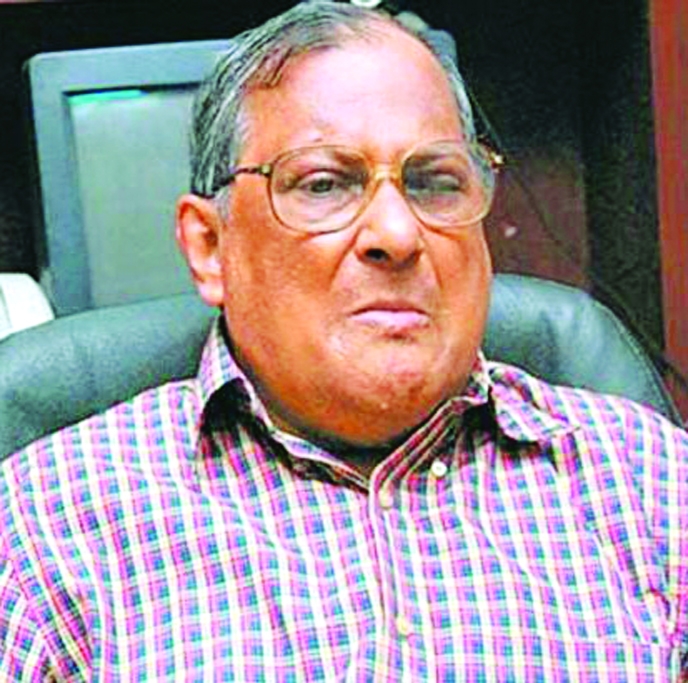
Staff Reporter :
Akbar Ali Khan, caretaker government advisor, economist, historian, researcher and teacher, was buried at Mirpur Martyred Intellectuals’ Graveyard on Friday after 3:00 pm.
His namaz-e-janaza was held at Gulshan Azad Mosque after the Juma prayers. The district administration gave him guard of honour.
Planning Minister MA Mannan, Cabinet Secretary Khandker Anwarul Islam,
Gonoshasthaya Kendra trustee Zafrullah Chowdhury, former NBR Chairman Badiur Rahman, among others, attended the namaz-e-janaza.
Earlier, the body of Akbar Ali Khan was taken to his Gulshan residence. Relatives and elites went there to pay their last respects to the acclaimed thinker.
Akbar Ali Khan breathed his last at around 10:00pm, his brother Kabir Uddin Khan said. He was 78.
Foreign Minister AK Abdul Momen, Dhaka University Vice-Chancellor Prof Dr Md Akhtaruzzaman and different organisations including Transparency International Bangladesh (TIB) and Bangladesh Economic Association condoled his death.
Akbar Ali Khan was born in 1944 at Nabinagar in the Brahmanbaria district. He studied history at Dhaka University and secured first place in first class in both BA and MA exams. He studied economics at Queen’s University Canada and obtained MA degree and PhD in economics.
He joined the Civil Service of Pakistan (CSP) in 1967. He actively participated in the Liberation War and was sentenced to 14 years’ imprisonment in absentia by a military court of the occupation forces. He joined the provisional government of Bangladesh as Deputy Secretary, Ministry of Defence.
Akbar Ali taught development economics and development administration for three years at the Bangladesh Public Administration Training Centre as a member directing staff. He taught postgraduate courses in governance and development studies departments at Brac University after his retirement.
He served with distinction in various ministries. He worked at the Ministry of Finance for more than 16 years as joint secretary and above. He was chairman of the NBR and secretary of the Internal Resource Division for nearly three years.
Akbar Ali served as finance secretary for more than five and half years covering three consecutive governments. He was appointed the cabinet secretary in 2001 and retired from that position in 2002.
He was an advisor in charge of the ministries of finance, planning, commerce, post, telegraph and telephones in the caretaker government in 2006 and resigned in protest against the failure of the chief advisor in ensuring a free, fair and impartial election. He also served as the first chairman of the Regulatory Reforms Commission during 2007-2009.
As Finance Secretary, he played a prominent role in establishing Grihayana Tahbil (Fund for Housing of the Poor) and Karmasangsthana (Employment Generation) Bank. He was the chairman of the Social Development Foundation for two years.
Dr Khan served as minister (economic) at Bangladesh Embassy in Washington DC for four years from 1987-1991. He was the alternative executive director of the World Bank for more than three years, as the representative of the governments of Bangladesh, Bhutan, Sri Lanka and India.
He was elected chairman of the 42-nation FAO sub-committee on Surplus Disposal (Food Aid) for the year 1989. He was elected Vice Chairman of the Officials Committee of the UNCTAD Trade Summit in Columbus, Ohio in 1995.
He has published 14 books and several articles on economics, history, public administration, literature and water resources in various national and international journals. His first book “Some Aspects of Peasant Behavior in Bengal” was praised by The Journal of Economic History (USA) as “a significant contribution to the growing body of new economic history in South Asia.”
Dr Khan’s book “Discovery of Bangladesh” was rated by the Asiatic Society of Bangladesh as the best publication in humanities for the period 1996-98 and was awarded the Justice Md Ibrahim gold medal. His book “Parathaparatar Arthaniti” was highly commended for its wit and originality by Desh – the most widely circulated literary magazine of Kolkata.
His book “People’s Participation in Budgetary Process in Bangladesh: In Search of Policy Reforms” was published in 2008 by Shamunnay – a national advocacy NGO. His latest publications include “Abak Bangladesh Bichitra Chhalanajale Rajneeti” (2017), “Gresham’s Law Syndrome and Beyond” (2015), “Ajab and Jabor Ajab Authraneeti” (2013), “Andhakarer Utsa Hote” (2011), and “Friendly Fires, Humpty Dumpty Disorder and other Essays” (2010).
Akbar Ali was a member of the American Economic Association and a life member of the Asiatic Society of Bangladesh. He was awarded the Maulana Akram Khan gold medal for distinguished public service and the Mercantile Bank gold medal for economics research.
He was elected fellow of Bangla Academy in 2010 in recognition of his contribution to the economics and history of Bangladesh.

